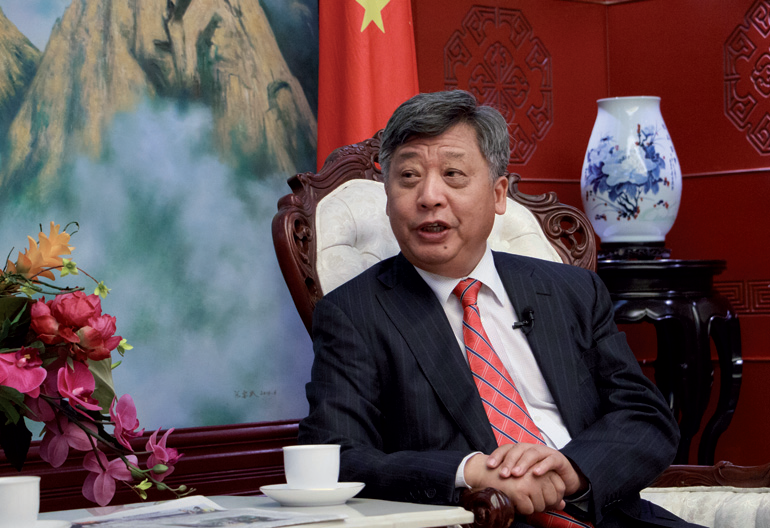Consul general to eight US states discusses trade


Enterprises, investment at state and city levels find ways around tariff spat
Consul General of China in Houston Li Qiangmin, in a recent interview with China Daily, reviewed the history of China-US trade and diplomatic relations over the past 40 years, analyzing the current trade frictions between China and the US and expressing optimism about the future.
Li said that since the reform and opening up and the establishment of diplomatic relations between China and the US, China has introduced American technology, talents and management expertise, which has greatly enhanced its economic capabilities.
Enterprises such as Haier and Huawei have become internationally competitive, which in turn has advanced China's technologies and innovations. Today China puts great emphasis on innovation investment. Companies such as Alibaba and Tencent have changed the way of life of the Chinese people. These are all beneficial results from China's reform and opening up and China-US relations.
Former US presidents Jimmy Carter and George H. W. Bush live in Li's consular jurisdiction.
"President Bush was the envoy to China for more than a year and was remembered as the bicycle ambassador. President Carter signed the normalization of the US-China diplomatic relationship. They both have made great contributions to the development of China-US relations," Li said.
In the past 40 years, trade and investment between the eight states in Li's jurisdiction and China have been growing steadily, Li said. Citing Houston as an example, Li said the city's major industries of energy, healthcare and space science are also among China's major goals.
Li said that since their cooperation going back as early as the 1970s, the US and China have enjoyed considerable cooperation in shale gas and oil extraction.
"Louisiana and Texas are the largest LNG bases in the US," he said. "The energy industry is an important resource for balancing the trade deficit with China with deals in tens of billions of dollars. Besides two current LNG terminals in the two states, several other terminals are under construction. The gas prices are cheaper than other regions. In fact, the LNG industry wants China to invest here."
Li said that in addition to the energy industry, up to 80 percent of the sorghum produced in Texas is exported to China for the manufacture of liquor.
In two years, China will enter the International Space Station. "This will bring new opportunities for the cooperation between the Houston Johnson Space Center and China. The cooperation between Texas Medical Center and China already involves many cities in China," he said.
Trade affected
Unfortunately the trade relationship between the southern US and China is also affected by the trade war provoked by the US, Li said. Great prospects for cooperation in the energy industry become uncertain with tariff threats.
The trade war is not the best way to resolve the bilateral trade deficit, said Li. China's tariff responses are to protect its own interests and done with rational thinking. At present, the friction between China and the US is mainly reflected in the trade tariffs.
"It affects bilateral economic exchanges and hurts the feelings and trust on both sides," Li said. "Many Americans have also seen that the trade war is akin to 'killing one thousand opponents and losing eight hundred of its own in the process', to borrow an old Chinese saying," he said.
Li, who was responsible for attracting investment to Hunan province, still remembers the case of enticing fast food chain McDonald's to open a store in Hunan in the 1990s.
US companies were enjoying a very favorable tax policy in China by paying only 10 percent corporate tax while the tax rate for Chinese companies was over 30 percent.
"I'd say that 90 percent of US companies were making money in China at the time. Now that these tax incentives are gone, China only offers a preferential investment environment," he said.
American companies are not satisfied with the current situation and hope to have better profits like they used to enjoy. Li believes that this is one of the reasons the US launched a trade war.
In addition, the trade war is also a product of American domestic politics, said Li. He believes that President Trump is using the trade war in the hope of gaining support from his electorate's base, primarily comprised of those who have benefited less from globalization.
"President Trump stressed that he wants to Make America Great Again. How to achieve that? He hopes to achieve this goal through trade tariffs, which is not based on facts."
Contact the writer at mayzhou@chinadailyusa.com

































